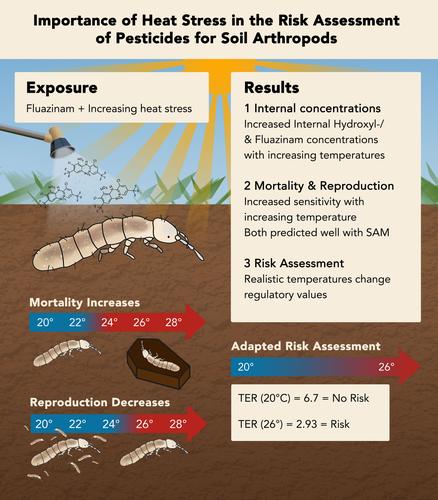当前位置:
X-MOL 学术
›
Glob. Change Biol.
›
论文详情
Our official English website, www.x-mol.net, welcomes your
feedback! (Note: you will need to create a separate account there.)
A Dirt(y) World in a Changing Climate: Importance of Heat Stress in the Risk Assessment of Pesticides for Soil Arthropods
Global Change Biology ( IF 10.8 ) Pub Date : 2024-10-25 , DOI: 10.1111/gcb.17542 Micha Wehrli, Stine Slotsbo, Inge S. Fomsgaard, Bente B. Laursen, Jonas Gröning, Matthias Liess, Martin Holmstrup
Global Change Biology ( IF 10.8 ) Pub Date : 2024-10-25 , DOI: 10.1111/gcb.17542 Micha Wehrli, Stine Slotsbo, Inge S. Fomsgaard, Bente B. Laursen, Jonas Gröning, Matthias Liess, Martin Holmstrup

|
The rise in global temperatures and increasing severity of heat waves pose significant threats to soil organisms, disrupting ecological balances in soil communities. Additionally, the implications of environmental pollution are exacerbated in a warmer world, as changes in temperature affect the uptake, transformation and elimination of toxicants, thereby increasing the vulnerability of organisms. Nevertheless, our understanding of such processes remains largely unexplored. The present study examines the impact of high temperatures on the uptake and effects of the fungicide fluazinam on the springtail Folsomia candida (Collembola, Isotomidae). Conducted under non‐optimum but realistic high temperatures, the experiments revealed that increased temperature hampered detoxification processes in F. candida , enhancing the toxic effects of fluazinam. High temperatures and the fungicide exerted synergistic interactions, reducing F. candida's reproduction and increasing adult mortality beyond what would be predicted by simple addition of the heat and chemical effects. These findings highlight the need to reevaluate the current ecological risk assessment and the regulatory framework in response to climate changes. This research enhances our understanding of how global warming affects the toxicokinetics and toxicodynamics (TK‐TD) of chemicals in terrestrial invertebrates. In conclusion, our results suggest that adjustments to regulatory threshold values are necessary to address the impact of a changing climate.
中文翻译:

气候变化中的泥土世界:热应激在土壤节肢动物农药风险评估中的重要性
全球气温上升和热浪的日益严重对土壤生物构成重大威胁,破坏了土壤群落的生态平衡。此外,在变暖的世界中,环境污染的影响会加剧,因为温度变化会影响有毒物质的吸收、转化和消除,从而增加生物体的脆弱性。然而,我们对这些过程的理解在很大程度上仍未得到探索。本研究考察了高温对杀菌剂氟嗪胺吸收的影响以及杀菌剂对弹尾 Folsomia candida (Collembola, Isotomidae) 的影响。在非最佳但真实的高温下进行,实验表明,温度升高阻碍了念珠菌的解毒过程,增强了氟嗪南的毒性作用。高温和杀菌剂产生协同作用,减少了念珠菌的繁殖,并增加了成虫死亡率,超出了通过简单地添加热量和化学效应所能预测的水平。这些发现凸显了重新评估当前生态风险评估和应对气候变化的监管框架的必要性。这项研究增强了我们对全球变暖如何影响陆生无脊椎动物中化学物质的毒代动力学和毒理动力学 (TK-TD) 的理解。总之,我们的结果表明,为了应对气候变化的影响,有必要调整监管阈值。
更新日期:2024-10-25
中文翻译:

气候变化中的泥土世界:热应激在土壤节肢动物农药风险评估中的重要性
全球气温上升和热浪的日益严重对土壤生物构成重大威胁,破坏了土壤群落的生态平衡。此外,在变暖的世界中,环境污染的影响会加剧,因为温度变化会影响有毒物质的吸收、转化和消除,从而增加生物体的脆弱性。然而,我们对这些过程的理解在很大程度上仍未得到探索。本研究考察了高温对杀菌剂氟嗪胺吸收的影响以及杀菌剂对弹尾 Folsomia candida (Collembola, Isotomidae) 的影响。在非最佳但真实的高温下进行,实验表明,温度升高阻碍了念珠菌的解毒过程,增强了氟嗪南的毒性作用。高温和杀菌剂产生协同作用,减少了念珠菌的繁殖,并增加了成虫死亡率,超出了通过简单地添加热量和化学效应所能预测的水平。这些发现凸显了重新评估当前生态风险评估和应对气候变化的监管框架的必要性。这项研究增强了我们对全球变暖如何影响陆生无脊椎动物中化学物质的毒代动力学和毒理动力学 (TK-TD) 的理解。总之,我们的结果表明,为了应对气候变化的影响,有必要调整监管阈值。


















































 京公网安备 11010802027423号
京公网安备 11010802027423号